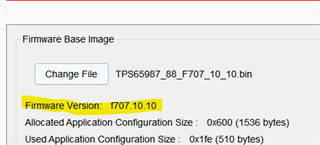Other Parts Discussed in Thread: , TPS65988, TPS65981, TPS65987
Hi, I need to distinguish between the older TPS6591/2/6 and the newer TPS6987/8 PD controller families. This is required to handle incompatibilities between them like the length of several registers (e.g. IntEvent is 8 bytes long in the old controllers, and 11 bytes long in the new ones).
My first approach was reading the content of registers like VID or DID, but that is not a valid solution because an application firmware can load new values. Therefore, I need a firmware-agnostic solution that can be used by a driver to identify either every single part number, or at least the device family (1/2/6 vs 7/8) via I2C.
Thanks and best regards,
Javier



